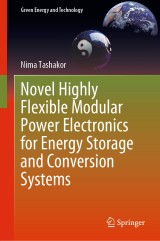Details

Novel Highly Flexible Modular Power Electronics for Energy Storage and Conversion Systems
Green Energy and Technology
|
171,19 € |
|
| Verlag: | Springer |
| Format: | |
| Veröffentl.: | 04.09.2023 |
| ISBN/EAN: | 9783031368431 |
| Sprache: | englisch |
Dieses eBook enthält ein Wasserzeichen.
Beschreibungen
This book describes improvements to the electronics topology of current modular reconfigurable storages by integrating parallel connectivity, reducing the semiconductor count by eliminating irrelevant states, and improving the monitoring techniques through higher function integration. The author also discusses each topology's main advantages and disadvantages at the micro and macro levels. Moreover, the presented modeling of modular reconfigurable storage systems with different storages helps in better understanding the dynamics of the system.<div><br></div><div>The book establishes novel optimum or near-optimum methods for exploiting the DOF (degrees of freedom) to achieve higher efficiency, more function integration, better balancing, or output quality. Additionally, through a detailed analysis of different modulation techniques, this book presents novel modulation methods, enhances the state-of-the-art, or in some cases, simplifies the complexity of implementation.<br></div><div><br></div><div>The concept of interconnected multi-port systems through integrating novel modulation techniques and the acquired understanding of the behavior of modular dynamically reconfigurable storages is explained. The presented concepts can significantly reduce the number of energy conversion stages as well as the final footprint of the system, reduce the number of required controlled semiconductors, and save costs. It also presents novel monitoring techniques based on estimators that can significantly reduce the number of required sensors and the required data-communication bandwidth.<br></div>
Introduction to Modular Energy Storage Systems.- Selected Types of Energy Storage.- Topology, Circuit Analysis, and Modeling.- Modulation and Scheduling Techniques.- Novel Topologies and/or Techniques for Emerging Applications.- Monitoring Methods.- Remaining Challenges and Future Potentials.
Nima Tashakor was born in 1990 in Shahrekord, Iran. He received a B.Sc. degree in electrical power engineering from Isfahan University, Isfahan, Iran, in 2013, where he worked on the harmonic sources in the electrical grid and how to filter them. He earned his M.Sc. degree in electrical power engineering from Shiraz University, Shiraz, Iran, in 2015. During his M.Sc. degree, he worked on developing an innovative electric vehicle charger.<div><br></div><div>He worked on his Ph.D. at the Technical University of Kaiserslautern, Germany, from 2019 to 2022 and collaborated closely with Duke University, USA, and Aalborg University, Denmark as a guest researcher. In 2021, he received a DAAD grant for collaboration with Aalborg University. In 2022, he was awarded the DAAD prize for outstanding achievements of international students.<br></div><div><br></div><div>His research fields include power electronics and energy storage\systems. Furthermore, he investigates the application of machine learning in power electronics domain.<br></div>
This book describes improvements to the electronics topology of current modular reconfigurable storages by integrating parallel connectivity, reducing the semiconductor count by eliminating irrelevant states, and improving the monitoring techniques through higher function integration. The author also discusses each topology's main advantages and disadvantages at the micro and macro levels. Moreover, the presented modeling of modular reconfigurable storage systems with different storages helps in better understanding the dynamics of the system.<div><br></div><div>The book establishes novel optimum or near-optimum methods for exploiting the DOF (degrees of freedom) to achieve higher efficiency, more function integration, better balancing, or output quality. Additionally, through a detailed analysis of different modulation techniques, this book presents novel modulation methods, enhances the state-of-the-art, or in some cases, simplifies the complexity of implementation.<br></div><div><br></div><div>The concept of interconnected multi-port systems through integrating novel modulation techniques and the acquired understanding of the behavior of modular dynamically reconfigurable storages is explained. The presented concepts can significantly reduce the number of energy conversion stages as well as the final footprint of the system, reduce the number of required controlled semiconductors, and save costs. It also presents novel monitoring techniques based on estimators that can significantly reduce the number of required sensors and the required data-communication bandwidth.</div>
Includes developing models for various reconfigurable storages and converters Presents in-depth investigation of modulation and control schemes and methods to improve them Provides a comprehensive study and analysis of different modular power-electronic systems
Diese Produkte könnten Sie auch interessieren:

Structural Dynamics in Engineering Design

von: Nuno M. M. Maia, Dario Di Maio, Alex Carrella

97,99 €

Verbesserung des Wissensmanagements in der manuellen Montage durch Einsatz eines Anreizsystems

von: Robin Dennis Sochor

59,99 €















